#someone cry over this wet cat of a tiefling with me
Text
Zevlor: An Angsty Character Analysis
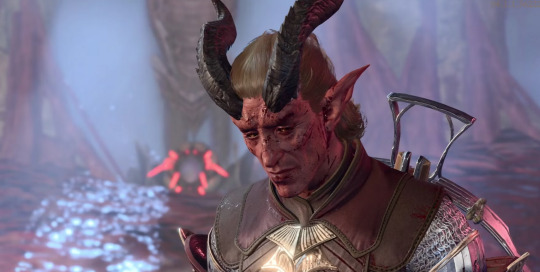
Hey, Zevlor simps. Can I interest anyone in 4,000 words about our favorite disaster tiefling? 💀
“We can’t stay, but we’ll be slaughtered if we leave—we’re no fighters.”
Back during my first play-through this is the line that turned Zevlor from another dime-a-dozen, exposition spouting NPC to a character I was legitimately interested in. “We’re no fighters.” My DnD ignorance abounds, but even I could see that wasn’t an accurate statement. Here’s a mountain of a man sporting fancier armor than my level 2 Tav knows exists yet, having wrecked half the goblin hoard with his crossbow and, if you let him, he'll happily turn to punching as a solution to verbal disagreements. Plus, he’s clearly the one giving the orders, so what do you mean you’re not a fighter?
Having explored the Grove a bit I chalked it up to a generalized assessment of the refugees as a whole. They’re mostly kids, civilians, and would-be protectors who only look the part of fighters in cobbled-together armor. One woman is grappling with the guilt of killing someone for the first time, even an enemy. Lakrissa is sure they’re all going to get slaughtered and is willing to put money on that fact. Meanwhile, the couple you meet are more concerned with what pet they’ll get when they somehow, someway, make it to the city. Don't worry about how that'll happen. You learn later that even those like Ronan are small potatoes compared to most of the baddies you’ll face. On paper he looks and sounds like the real deal—dressed in robes, talking up an apprenticeship with the famous Lorroakan—but scenes like the celebration light show and his own fury at needing to be saved, again, highlight how far he still has to go. The point is that Zevlor is right: these aren’t fighters and he at 18 strength, paladin, former commander, is definitely the exception.
However, BG3 is the sort of detail-heavy game where I’d expect them to include that exception in the dialogue. “We can’t stay, but we’ll be slaughtered if we leave—these people aren’t fighters.” Zevlor’s inclusion of himself in this assessment continued to nag at me and it didn’t start to make sense until I delved into his tag here on tumblr, with more patient players than myself posting everything there is to know about the tiefling. (Thanks, all.) Zevlor is fascinating to me in part because he has this contradictory nature, one example of which is that he’s a very talented fighter who desperately doesn’t want to be a fighter anymore.
…but also he totally does.
We overhear in his dialogue to Tilses that Zevlor is adamant about shedding the titles he’s earned through combat: Hellrider, Commander, Sir. He insists that they’re just civilians now and it’s not like he’s being disingenuous here—note that he introduces himself as just “Zevlor” to Tav. Zevlor means what he says to Tilses and we can see that he’s trying to both reinforce his point and lesson the blow by referring to her as “Tilly.” The nickname is a sweet one, hinting at their close bond in just a single word, reminding her that he’s not saying this to hurt her, he cares for her… but the nickname is simultaneously something he never would have used as her commander. The intimacy meant to comfort is also a hard blow to weather. They're now people who use nicknames inappropriate for the hierarchy of battle.
So Zevlor means what he says here, means it enough that Tilses is convinced and drops her use of “Commander,” but there’s definitely a hint of bitterness in his voice. At least, I’ve always heard it. Zevlor is steadfast in his conviction here, even going so far as to say, “I’m done soldiering, Tilly” when discussing what will come next at Baldur’s Gate. Yet for all of that his tone conveys (understandable) anger and disappointment that it’s come to this. Zevlor doesn’t act like someone who truly wants this change, but rather someone who’s been forced to accept it.
Is it outside forces unwillingly influencing him then? Did Avernus truly change things irrevocably? No, not really. At least, not in the way Zevlor likes to claim. Tilses herself states that being a Hellrider is for life; nothing can take away that title. You lost your post? Your whole city? Most of the people under your protection? Doesn’t matter! You’re a Hellrider forever, no matter the circumstances. I can easily picture a time in Zevlor's life where he would have agreed with Tilses wholeheartedly. They are Hellriders, dammit, and so long as there’s one person looking for their help they will wield that title alongside their blades. And right now, Zevlor has a lot more than just one person in need of his assistance.

So it’s not that Avernus truly stripped them of that identity. Nothing can do that. Zevlor is not rejecting titles and planning retirement because the mechanisms of fate are forcing him to.
He’s doing all that because he’s lost confidence in himself.
Even as someone with a shaky understanding of DnD classes, I love the parallel between a broken oath and the rejection of a lifelong title. If Zevlor can fail in his oath—or in his faith entirely, according to the memories stemming from his pod—why-ever would he think that any other ‘permanent’ part of his identity was worth fighting for? If you can loose the very thing you’ve built your entire life around, every important aspect of yourself, tied to your very soul… what’s a bestowed title compared to that? Zevlor doesn’t believe himself worthy of being a Hellrider anymore, but I think that goes deeper than a string of horrific circumstances making him feel incompetent. As an Oathbreaker, Zevlor likely believes that if he couldn’t uphold that, he can’t uphold anything. Calling himself a Hellrider would be a lie. A fiction. A pathetic, dangerous, insulting fiction at that. It’s like calling yourself the “Hero” while continually failing those around you. Sure, others might insist it’s a title you’ve earned, one you will always carry with you, but you don’t believe them anymore and at a certain point calling yourself that feels worse than embracing the title of “Villain." You don’t want to be the villain… but you want to pretend you’re the hero even less. Pretending is exhausting.
We see this struggle in the many ways that Zevlor fails, or almost fails, to uphold the ideals that originally guided him. I use the term “villain” above deliberately because Zevlor is not merely a former hero-type who’s self confidence has been shattered, or who has been reduced to a civilian, or who thinks themselves useless; he’s actively fighting against temptations that, under less stressful situations, he’d never even consider. I don’t think he is a villain, I think he’s a flawed, struggling victim who sees his own, inevitable mistakes as villainous—and the longer that warped perspective continues the easier it is to fall into bad behaviors. This cycle is perfectly summarized in the autobiography Zevlor keeps by his bed:
“When every passer-by thinks you a thief and a heretic, it is deeply tempting to become one.”
We don’t know if this is Zevlor’s autobiography (as far as I’m aware, anyway) but even if it’s not the words have clearly resonated enough for him to keep them nearby. This particular line paints a pretty clear picture of Zevlor’s struggle. If everyone you meet says you’re devil-kin, vermin, or would-be criminal, isn’t it easier to just give them what they want? If you can’t persuade them otherwise, why put in the effort of trying? If he can’t be Faithful to his God, why have faith in anything at all? If he can’t save these people—setback after setback, mistake after mistake—why is he even making the effort?
Zevlor obviously is trying, very, very hard, which is why such thoughts are merely temptations rather than actual, questionable actions. Still, the Grove gives us numerous examples of the precipice he’s balanced on—and the ways Tav can tip him in one direction or another. You can talk Zevlor down from his anger and get him to acknowledge his disgust in nearly sinking to Aradin’s level. You can also let him boil over and punch the human at a time when the last thing anyone needs is more violence. You can convince Zevlor that there are peaceful ways of stopping Kagha's ritual, or you can help him in pursuing the darker temptation to kill her. It’s a “low” thought, but at his own admission he hasn’t been above entertaining it. Zevlor’s requests for help, though always polite and humble, carry a spark of manipulation in them too. He’s not above leveraging your previously selfless good deed to his advantage—"She owes you for saving this grove"—and if you approach him before speaking with Kagha he’ll claim that the ritual will “be trouble—for all of us.” Except, no? Not really? Tav can make it clear that they’re just here for a healer, they’re only passing through, and as a fighter they are not beholden to the Grove’s sanctuary as the teiflings are. It’s not trouble for everyone involved, yet Zevlor frames it as such in the hopes that (unnecessary) self-interest may motivate you if selflessness fails. Finally, if Zevlor dies in your play-through and you use Speak the Dead on him, he will admit to having “plenty” of secrets, none of which he’ll share. Admittedly, this may be the result of cut content, specifically a story-line in which Zevlor knowingly betrays the tieflings rather than being tricked by the Absolute. Still, the game as it stands is the story we have and within it we’re given a man who is both fighting against these dark urges (ha) and has a past riddled with secrets. If Zevlor is anything, it’s blunt when it comes to his own failings, accurate and otherwise. So how terrible must these secrets be that he outright refuses to divulge them when, generally speaking, most corpses speak freely in death?
However, out of all of this the struggle I’m most intrigued by is the one surrounding the gate. Zevlor represents the tieflings: persecuted refugees, vulnerable civilians, people seeking to survive through cooperation, specifically by joining a community. Kagha represents the druids (or at least a vocal subset of them in Halsin’s absence): bigoted individuals, powerful fighters, people seeking to survive by giving in to their fears, specifically by keeping themselves isolated. This is the moral dichotomy of the Grove and it is symbolized through the gate. Zevlor wants to open it to everyone whereas Kagha wants to close it, permanently.
So isn’t it odd that Zevlor is the one ordering it shut?
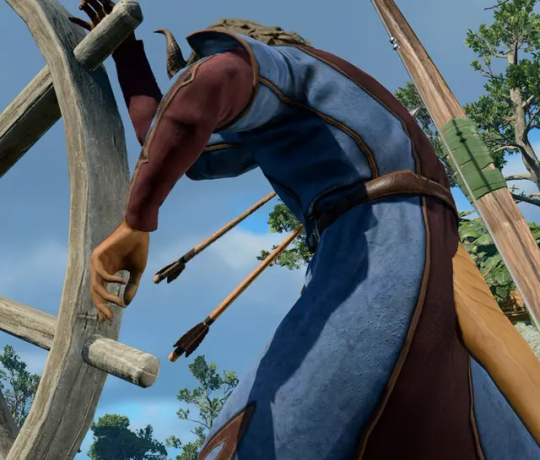
When the scene first starts Kanon shouts down that no, he won’t open the gate. Zevlor said that no one is allowed in. Notably, he’s saying this to Aradin and his crew, people that the Grove is at least passingly familiar with, given that Halsin left with them to search the temple. It’s also notable that Zevlor isn’t expecting goblins to attack the Grove. He’s shocked that this is suddenly a problem, brought about by Aradin’s decision—“You lead them here?”— and the entire point of staying at the Grove is that it’s at least comparatively safe. Yes, there have been more attacks lately, but Zevlor seems to be relying on the Grove’s relatively unknown location, as well as the fact that goblins are normally disorganized. The safety is only compromised because Aradin brought a hunting party back, so Zevlor has no reason to expect any visitors, let alone ones that would be a threat.
More importantly, he should welcome such visitors even if he did expect them. After all, that’s precisely what the tieflings are: strangers with no ulterior motives other than to survive. Broadly speaking it makes perfect sense why he'd shut the gates. Zevlor’s first priority is to his people, so anything that keeps them safe is, theoretically, a good thing. But through the lens of his specific characterization and this specific, moral dilemma, it’s an awfully hypocritical decision. Based on everything we’ve seen, our party would not have been welcomed by Zevlor if we’d arrived without danger on our heels and a rescue to endear him to us. So his people should be welcomed, trusted, kept safe, given the benefit of the doubt… but Zevlor isn’t necessarily willing to extend that same trust to others. At the end of the day, he and Kagha want a version of the same thing: safety for those they deem are worthy of it.
It’s precisely these flaws and temptations that make Zevlor such a great character to me, even before he’s tricked by the Absolute. The fandom has leaned hard into Zevlor’s self-loathing and let me tell you, I love it (kisses, hugs, and cookies for you all), but canonically I think he has more reason to fear himself than we tend to portray in the H/C fics. I’m not saying he’s a bad person. Rather, it’s precisely because Zevlor is such a good person that he has the capacity to fall so far. It’s his all-consuming desire to protect his family that leads Zevlor to do and consider so much that a paladin would normally balk at. Denying others the safety you’ve been granted. Subtly manipulating others to do your dirty work. Considering murder.
Zevlor is someone torn between doing the Right Thing and the thing he believes will help those under his care survive. Importantly, when we first meet him he considers these to be two separate courses of action. So can you imagine what goes through his head when he first sees Tav saving everyone and doing so righteously? I think it’s integral to Zevlor’s characterization that the game all but forces you to play the Good Guy in that initial encounter. A cut scene starts, you’re thrown into combat immediately afterwards, and unless you plan to start attacking the Grove members alongside the goblins (which the mechanics discourage through the coloring that distinguishes enemies from allies) you will always finish this fight as Zevlor’s hero. Sure, you can be an asshole afterwards and demand payment. You could already be plotting your betrayal and the slaughter of all the refugees. But in this moment you are nothing but a miracle made flesh in his eyes. Right from the start Tav is succeeding in all the ways Zevlor feels like he's failed. You're the hero.
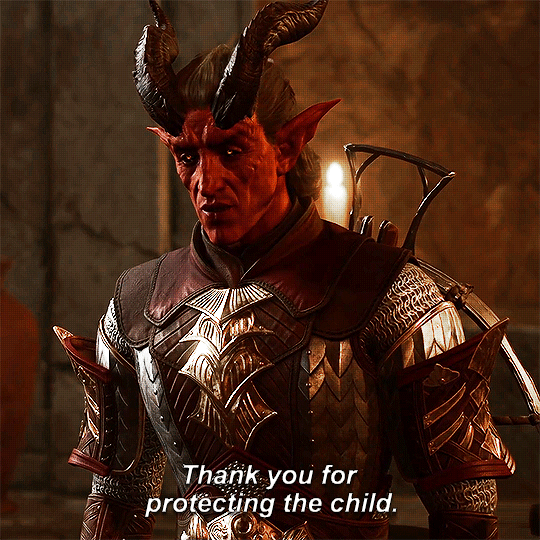
More specifically, you’re an Every-Man Hero. We might have epic backstories for our Tavs, but within confines of the game you’re largely a nobody when not playing an Origin character. How powerful must that have been to witness then? A total stranger, someone who has no ties to the tieflings or even, depending on your class, any sworn reason to help others, putting their life on the line to save what is most precious to Zevlor? I think a lot about the fact that he never asks Wyll to step in and try to change Kagha’s mind. She owes him just as much as she does Tav—Wyll is an equal participant in that fight and, if your shoddy play style is anything like mine, he likely did more damage—and Wyll is clearly invested in the tiefling’s survival, training the kids as he is. Now, obviously Zevlor’s reticence is largely a question of assigned roles (we need to be the one engaging with Kagha because we’re the protagonist/player) but, like Zevlor’s choice to include himself in the Not a Fighter group, it would have been all too easy to explain this away within the narrative. One comment about how Wyll already tried and failed, or how Kagha doesn’t trust Warlocks, or hell, maybe you don’t meet Wyll in the Grove at all. It’s an easy thing to accomplish and though this is edging more into the realm of headcanon than anything else, I can’t help but think that Wyll isn’t the kind of person that Zevlor could turn to for help right now. Because he’s a folk hero. The Blade of Frontiers, known far and wide for his impressive, selfless deeds. Zevlor is struggling so hard to keep the tieflings safe, tempted by all the unsavory solutions that might achieve that, drowning in self-hatred as his past and current failings catch up with him, wanting nothing more than to be his peoples’ protector:
“I would be a paladin again—with a god’s purpose, a god’s power. Everything I needed to protect my people. And all the while, the cult tortured them. They fought, and ran, and died around me, while I imagined myself their savior.”
Three of the things Zevlor mutters while trapped in the pod are “Hellrider… for… life…,” “Trust… in me…,” and “Children… look away… look at me…” He wants to be the protector, the one children look to for reassurance, he wants his words to Tilly to be a lie and he wants a way to prove that he is a Hellrider for life… but he’s not. At least, Zevlor doesn’t believe it. He lost his titles while Wyll still proudly bears his. Wyll trains the children to fight while Zevlor can only get swept up in anger at them being threatened. The people trust Wyll, adore him, he’s the hero and Zevlor… is not. Not anymore.
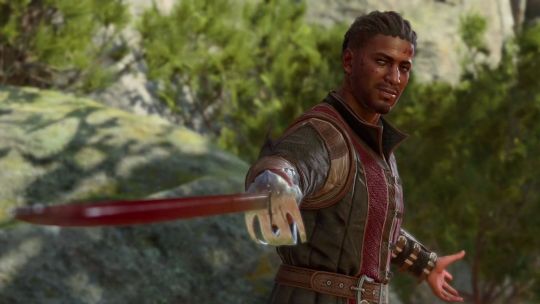
It’s too painful to approach Wyll and admit all that. That would be a hell of a blow to Zevlor's pride. But Tav? A stranger? A nobody? The Every-man who had no reason to help or reputation pressuring them, saving them anyway? That’s inspiring. Someone like Tav could be the answer and even, perhaps, the proof that Zevlor could redeem himself. Neither of them are folk heroes, untouchable in their assumed perfection. Tav is a living, breathing example of how the flawed, everyday adventurer can be everything Zevlor strives for.
No wonder he won’t shut up about them in the Shadowlands.
All of this is why it’s so tragic that Zevlor wasn’t given a redemption arc. Sure, you can recruit him for the final battle against the Netherbrain, but there’s no quest to change the cast’s opinion of him—or change Zevlor’s opinion of himself. All his content at the end of Act 2 and Act 3 reinforces that self-hatred.
Let’s make a list, shall we?
Nearly every line of his reunion with Tav has Zevlor painting himself in the worst light possible, from “a lie kinder than the truth” to his refusal to join you because he believes he’ll stab you in the back. You cannot convince him of the Absolute’s manipulation and there’s no response to his belief that such horrors start within the person like, “Of course it does! Because we’re all flawed and equally capable of good and evil deeds! That potential doesn’t make you irredeemable, Zevlor, it makes you mortal!!”
He’s utterly failed as his peoples’ champion and he’s also deemed “unworthy” of being a True Soul. Obviously not being chosen by the Absolute is a good thing, but for a man drowning in self-loathing that’s one hell of a complicated rejection.
Nearly all the tieflings hate him now, all those people he’s been sacrificing his soul to keep safe. I found it particularly devastating that this is one of the rare occasions where nailing a persuasion check doesn’t change the person’s mind. There’s at least one tiefling at Moonrise (I’m drawing a blank on her name) who will believe you when you explain how the Absolute influenced Zevlor, but that doesn’t lead to forgiveness.
Zevlor is deemed unimportant on a literal, narrative level. He is very easy to miss in the pods (I nearly did on my first play-through) and the game does incredibly little to dissuade you from that mistake. Putting aside for a moment that obviously an Origin companion is more significant than a minor NPC, compare this to Shadowheart screaming from her own pod, the game making it abundantly clear that this is someone in need of help—someone worth rescuing. She’ll even say later that you could have run past, more concerned with your own survival and the big picture heroics to bother with her. How must it feel then, if Zevlor ever learns that Tav was there and never stopped for him?
If you do miss Zevlor… oh boy. We’ve probably all seen at least a recording of Orin’s so-called gift. There are plenty of characters who can meet untimely and devastating ends, but very few go through this level of horror. Zevlor—after being held captive, remember—is tortured by God’s Favorite Torturer. He is stripped of his personhood and reduced to a mere “message,” a “pet.” Zevlor is further humiliated in death by being literally stripped of his armor—not just vulnerable in his nakedness, but denied the last symbol of his faith, his status, his power—and it’s always struck me that this is the closest we see to him 'enjoying' an intimate moment, this parody in Orin’s painting. Zevlor is one of the NPC’s most in need of physical comfort and instead he’s forced into this torturous mockery of a sex scene. It also hits hard that when Tav first spots his body the narration says that Zevlor “might almost be sleeping.” Undoubtedly this is a man who isn’t taking good care of himself. He needs a good night’s rest, yet this horrifying trick is all he gets.
As if all this weren’t enough, most of your companion are VERY critical of Zevlor while commenting on his demise. It’s one thing for the tieflings to believe the worst given their ignorance and the fact that they are the ones who suffered from Zevlor’s failure, but your company understands the Absolute and the ways that she gets her hooks in people. Still, Astarion calls him a “wet rag” even if he did deserve better than this. Shadowheart wouldn’t have wished this on him either, but she can’t help but slip in a “no matter his failings.” Lae’zel, often the most blunt, straight up says that he was “always destined to fail his people—and to fail us.” Wyll shakes his head and intones that “even good intentions can lead us down deadly paths.” Only Gale and Karlach stick to mourning the dead rather than airing his shortcomings.
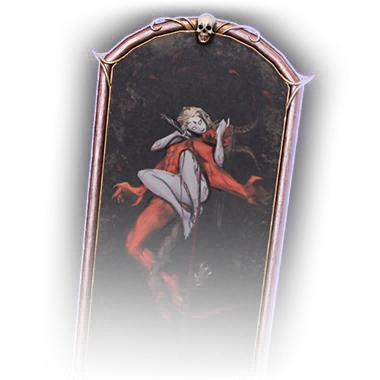
When I spoke to my allies before the final battle Zevlor didn’t have a cut scene. It became clear to me later that this must have been a bug in my play-through, but at the time it only reinforced my feelings that his story was incomplete. Looking on Youtube I’ve found recordings of him saying that he is a Hellrider once more and he would “die a proud man if [he] were to die this day”… but that rings as terribly hollow given where we left him. Last we were together, Zevlor was saying in no uncertain terms that he could not be trusted, he would fail again, he was unworthy of forgiveness. Where did this change of heart come from? It makes perfect sense that he would help Tav in this moment—he begs to be of some use after getting free—but not that he would present himself with such confidence. Within the story as it’s been told this feels… fake. Like Zevlor is putting on a mask to fit the mood of this lively, optimistic party. Which, in turn, gives the “I would die a proud man” line a terrifying implication to me. Does Zevlor expect to die this day? Does he intend to? What would persuade him not to lay down his life here and now? His mission is complete. The tieflings are safe—though not by his hand. There's no hero's welcome waiting for him after this battle. They hate him. He hates himself, and by his own admission the one thing that could still make him proud would be to die at Tav’s side, trying to do one last bit of good. If someone said that to me after everything Zevlor has been through I would keep them far away from the front lines.
(I did, for the record lol.)
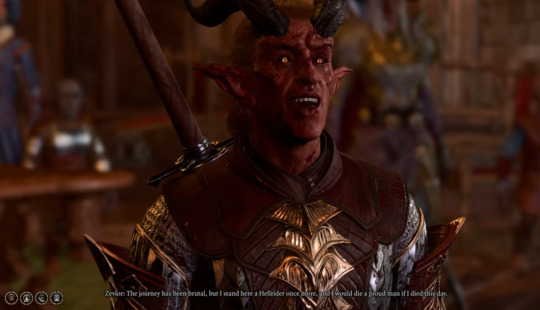
I’m not saying anything new then when I go, “Larian, PLEASE add more to his story.” Give us a Zevlor side-quest to renew his oath. Let us invite him to our camp. Something to link the broken man mid-game and the confident fighter at the end so that the latter doesn’t feel like an alarm bell with two legs and a tail. I mean yeah, I get hooked on minor characters so 75% of this is simply me wanting more content of a fave, but I also I do legitimately believe that BG3’s story would benefit from tying up loose ends like this.
Zevlor is a fantastic character, someone who contains an astounding amount of complexity for so little screen time. You have to follow up on that complexity though. If he’s meant to be a purely tragic figure, okay, fine, that’s the ending you get with Orin. But one where he joins you with a smile and reclaims a title he's previously rejected with such fervor requires more work in the middle; a through-line that explains how someone with so much self-loathing learns to think of himself as the hero again.
Because it does all come down to Zevlor’s perception of himself. He was always a hero, flaws and all. He always was and always will be a Hellrider.
The UI knows what's up :)

#BG3#Zevlor#bg3 Zevlor#wow this took forever#someone cry over this wet cat of a tiefling with me#mymetas
442 notes
·
View notes